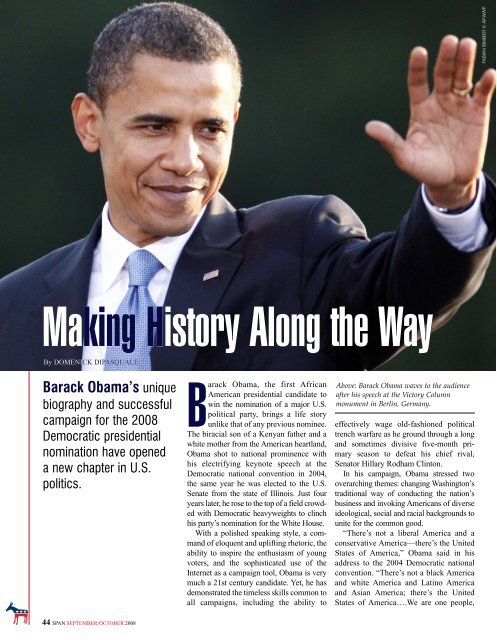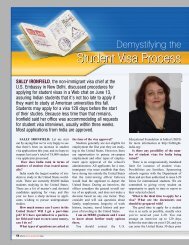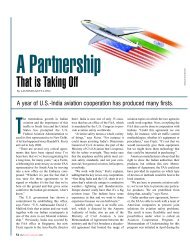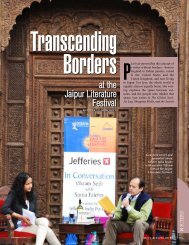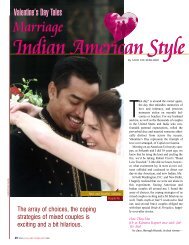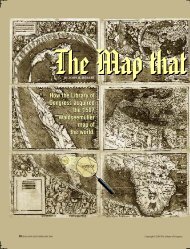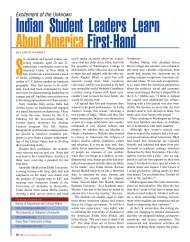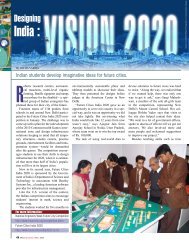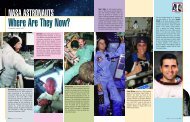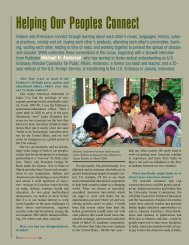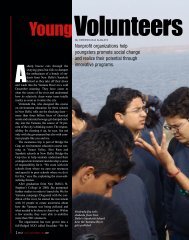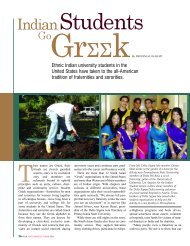Making History Along the Way, SPAN September ... - SPAN Magazine
Making History Along the Way, SPAN September ... - SPAN Magazine
Making History Along the Way, SPAN September ... - SPAN Magazine
Create successful ePaper yourself
Turn your PDF publications into a flip-book with our unique Google optimized e-Paper software.
<strong>Making</strong> <strong>History</strong> <strong>Along</strong> <strong>the</strong> <strong>Way</strong><br />
By DOMENICK DIPASQUALE<br />
Barack Obama’s unique<br />
biography and successful<br />
campaign for <strong>the</strong> 2008<br />
Democratic presidential<br />
nomination have opened<br />
a new chapter in U.S.<br />
politics.<br />
44 <strong>SPAN</strong> SEPTEMBER/OCTOBER 2008<br />
Barack Obama, <strong>the</strong> first African<br />
American presidential candidate to<br />
win <strong>the</strong> nomination of a major U.S.<br />
political party, brings a life story<br />
unlike that of any previous nominee.<br />
The biracial son of a Kenyan fa<strong>the</strong>r and a<br />
white mo<strong>the</strong>r from <strong>the</strong> American heartland,<br />
Obama shot to national prominence with<br />
his electrifying keynote speech at <strong>the</strong><br />
Democratic national convention in 2004,<br />
<strong>the</strong> same year he was elected to <strong>the</strong> U.S.<br />
Senate from <strong>the</strong> state of Illinois. Just four<br />
years later, he rose to <strong>the</strong> top of a field crowded<br />
with Democratic heavyweights to clinch<br />
his party’s nomination for <strong>the</strong> White House.<br />
With a polished speaking style, a command<br />
of eloquent and uplifting rhetoric, <strong>the</strong><br />
ability to inspire <strong>the</strong> enthusiasm of young<br />
voters, and <strong>the</strong> sophisticated use of <strong>the</strong><br />
Internet as a campaign tool, Obama is very<br />
much a 21st century candidate. Yet, he has<br />
demonstrated <strong>the</strong> timeless skills common to<br />
all campaigns, including <strong>the</strong> ability to<br />
Above: Barack Obama waves to <strong>the</strong> audience<br />
after his speech at <strong>the</strong> Victory Column<br />
monument in Berlin, Germany.<br />
effectively wage old-fashioned political<br />
trench warfare as he ground through a long<br />
and sometimes divisive five-month primary<br />
season to defeat his chief rival,<br />
Senator Hillary Rodham Clinton.<br />
In his campaign, Obama stressed two<br />
overarching <strong>the</strong>mes: changing Washington’s<br />
traditional way of conducting <strong>the</strong> nation’s<br />
business and invoking Americans of diverse<br />
ideological, social and racial backgrounds to<br />
unite for <strong>the</strong> common good.<br />
“There’s not a liberal America and a<br />
conservative America—<strong>the</strong>re’s <strong>the</strong> United<br />
States of America,” Obama said in his<br />
address to <strong>the</strong> 2004 Democratic national<br />
convention. “There’s not a black America<br />
and white America and Latino America<br />
and Asian America; <strong>the</strong>re’s <strong>the</strong> United<br />
States of America….We are one people,<br />
FABIAN BIMMER © AP-WWP
all of us pledging allegiance to <strong>the</strong> Stars<br />
and Stripes, all of us defending <strong>the</strong> United<br />
States of America.”<br />
The early years<br />
Obama’s parents came from vastly different<br />
backgrounds. His mo<strong>the</strong>r, Ann<br />
Dunham, was born and raised in smalltown<br />
Kansas. After her family moved to<br />
<strong>the</strong> Hawaiian Islands, she met Barack<br />
Obama Sr., a Kenyan scholarship student<br />
enrolled at <strong>the</strong> University of Hawaii. The<br />
two married in 1959, and on August 4,<br />
1961, Barack Obama Jr. was born in<br />
Honolulu. Two years later <strong>the</strong> senior<br />
Obama left his new family, first for graduate<br />
study at Harvard and <strong>the</strong>n for a job as a<br />
government economist back in Kenya. The<br />
young Obama met his fa<strong>the</strong>r again only<br />
once, at 10.<br />
When Obama was 6, his mo<strong>the</strong>r remarried,<br />
to an Indonesian oil executive. The<br />
family moved to Indonesia, and Obama<br />
spent four years attending school in<br />
Jakarta. He eventually returned to Hawaii<br />
and went to high school <strong>the</strong>re while living<br />
with his maternal grandparents.<br />
In his first book, Dreams from My<br />
Fa<strong>the</strong>r, Obama describes this period of his<br />
life as having more than <strong>the</strong> usual share of<br />
adolescent turmoil, as he struggled to make<br />
sense of a biracial heritage <strong>the</strong>n still relatively<br />
uncommon in <strong>the</strong> United States.<br />
Being rooted in both black America and<br />
white America may have helped give<br />
Obama <strong>the</strong> expansive vision he brought to<br />
politics years later, one that understands<br />
both points of view.<br />
“Barack has an incredible ability to syn<strong>the</strong>size<br />
seemingly contradictory realities<br />
and make <strong>the</strong>m coherent,” his law school<br />
classmate Cassandra Butts told New<br />
Yorker magazine. “It comes from going<br />
from a home where white people are nurturing<br />
you, and <strong>the</strong>n you go out into <strong>the</strong><br />
world and you’re seen as a black person.”<br />
Obama left Hawaii once more to attend<br />
Occidental College in Los Angeles,<br />
California, for two years. He later moved<br />
to New York City and earned a Bachelor<br />
of Arts degree from Columbia University<br />
in 1983. His relatively short stay in New<br />
York shaped a desire to work at <strong>the</strong> grass<br />
roots level, as Obama saw first-hand <strong>the</strong><br />
chasm separating <strong>the</strong> city’s wealthy elite<br />
from ghetto dwellers struggling with a<br />
host of devastating social ills.<br />
The Illinois years<br />
In search of his identity and a purposeful<br />
direction in life, Obama subsequently left<br />
his job as a financial writer with an international<br />
consulting firm in New York and<br />
headed to Chicago, Illinois, in 1985. There,<br />
he worked as a community organizer for a<br />
coalition of local churches on <strong>the</strong> city’s<br />
South Side, a poor African American area<br />
hard hit by <strong>the</strong> transition from a manufacturing<br />
center to a service-based economy.<br />
“It was in <strong>the</strong>se neighborhoods that I<br />
received <strong>the</strong> best education I ever had,<br />
and where I learned <strong>the</strong> true meaning of<br />
my Christian faith,” Obama recounted<br />
years later in <strong>the</strong> speech announcing his<br />
presidential candidacy.<br />
Obama enjoyed some tangible successes<br />
in this work, giving South Side residents<br />
a voice in such issues as economic<br />
redevelopment, job training and environmental<br />
clean-up efforts. He viewed his<br />
primary role as a community organizer,<br />
however, as that of a catalyst mobilizing<br />
ordinary citizens in a bottom-up effort to<br />
forge indigenous strategies for political<br />
and economic empowerment.<br />
After three years, Obama concluded that<br />
to bring about true improvement in such<br />
distressed communities required involvement<br />
at a higher level, in <strong>the</strong> realm of law<br />
and politics. Accordingly, he attended<br />
Harvard Law School in Cambridge, Massachusetts,<br />
where he distinguished himself by<br />
being elected <strong>the</strong> first black president of <strong>the</strong><br />
prestigious Harvard Law Review and graduating<br />
magna cum laude (with great honor)<br />
in 1991.<br />
With such impeccable credentials,<br />
“Obama could have done anything he<br />
wanted,” says David Axelrod, now his<br />
presidential campaign strategist. Obama<br />
returned to his adopted hometown of<br />
Chicago, where he practiced civil rights<br />
law and taught constitutional law at <strong>the</strong><br />
University of Chicago. In 1992 he married<br />
Michelle Robinson, ano<strong>the</strong>r Harvard Law<br />
graduate, and worked on voter registration<br />
in Chicago to help Democratic candidates<br />
such as Bill Clinton.<br />
With a continuing strong commitment<br />
to public service, Obama decided to make<br />
his first run at elective office in 1996, winning<br />
a seat from Chicago in <strong>the</strong> Illinois<br />
state senate. In many ways <strong>the</strong> race was a<br />
logical progression of his earlier work as a<br />
Obama for America © AP-WWP MARY ANN CHASTAIN © AP-WWP<br />
Top: Michelle and Barack Obama dance<br />
as Oprah Winfrey (right) looks on at <strong>the</strong><br />
Williams Brice Stadium in Columbia,<br />
South Carolina.<br />
Above: Obama teaching at <strong>the</strong> University<br />
of Chicago Law School.<br />
community organizer, and Obama brought<br />
much of that same expansive outlook—<strong>the</strong><br />
politician as an enabler of citizen-directed<br />
grass roots efforts and a builder of broadbased<br />
coalitions—to his vision of politics.<br />
“Any African Americans who are only<br />
talking about racism as a barrier to our success<br />
are seriously misled if <strong>the</strong>y don’t also<br />
come to grips with <strong>the</strong> larger economic<br />
forces that are creating economic insecurity<br />
for all workers—whites, Latinos and<br />
Asians,” he said at <strong>the</strong> time. Among his<br />
legislative accomplishments by <strong>the</strong> end of<br />
eight years in <strong>the</strong> state senate were campaign<br />
finance reform, tax cuts for <strong>the</strong><br />
working poor, and improvements to <strong>the</strong><br />
state’s criminal justice system.<br />
The national stage<br />
In 2000, Obama made his first run<br />
for <strong>the</strong> U.S. Congress, unsuccessfully<br />
<strong>SPAN</strong> SEPTEMBER/OCTOBER 2008 45<br />
<br />
<br />
<br />
<br />
<br />
BARACK OBAMA
challenging Bobby Rush, an incumbent<br />
Democrat from Chicago, for Rush’s seat in<br />
<strong>the</strong> House of Representatives. Dispirited<br />
by his lopsided primary loss to Rush and<br />
searching for influence beyond <strong>the</strong> Illinois<br />
state legislature, he sold Michelle on <strong>the</strong><br />
idea of his running for <strong>the</strong> U.S. Senate in a<br />
last-shot “up or out strategy” to advance<br />
his political career.<br />
The 2004 U.S. Senate race in Illinois<br />
had turned into a free-for-all <strong>the</strong> year<br />
before, when <strong>the</strong> Republican incumbent,<br />
Peter Fitzgerald, announced he would not<br />
seek re-election. Seven Democrats and<br />
eight Republicans contested <strong>the</strong>ir respective<br />
party’s primary for <strong>the</strong> senatorial<br />
nomination. Obama easily captured <strong>the</strong><br />
Democratic nomination, winning a greater<br />
share of <strong>the</strong> vote—53 percent—than his<br />
46 <strong>SPAN</strong> SEPTEMBER/OCTOBER 2008<br />
six opponents combined.<br />
With <strong>the</strong> Republicans <strong>the</strong>n holding <strong>the</strong><br />
100-member U.S. Senate by a razor-thin<br />
majority of 51 seats, Democrats saw <strong>the</strong> senatorial<br />
contest in Illinois as critical to <strong>the</strong>ir<br />
chances of retaking <strong>the</strong> Senate that<br />
November (in fact, <strong>the</strong>y only regained control<br />
in 2006). The desire to give Obama’s<br />
campaign a boost through a prominent convention<br />
role, <strong>the</strong> well-known oratory skills<br />
Obama possessed, and <strong>the</strong> very favorable<br />
impression he already had made on<br />
Democratic presidential candidate John<br />
Kerry, clinched <strong>the</strong> decision to select Obama<br />
as <strong>the</strong> convention’s keynote speaker.<br />
Obama’s speech, with its soaring, polished<br />
language on <strong>the</strong> need to transcend<br />
partisan divisions and its call for a “politics<br />
of hope” ra<strong>the</strong>r than a politics of cynicism,<br />
Obama Presidential Campaign © AP-WWP<br />
did more than rouse convention-goers; it<br />
catapulted Obama into <strong>the</strong> national media<br />
spotlight as a rising star of <strong>the</strong> Democratic<br />
Party. He went on to win handily in <strong>the</strong><br />
Senate race that autumn, capturing an overwhelming<br />
70 percent of <strong>the</strong> popular vote.<br />
Although <strong>the</strong> near-total disarray that year<br />
among Republicans in Illinois undoubtedly<br />
contributed to <strong>the</strong> landslide margin,<br />
Obama’s victory was impressive in its own<br />
Above: Barack Obama, holding daughter Malia,<br />
and wife Michelle, holding daughter Sasha,<br />
after winning <strong>the</strong> U.S. Senate race in 2004.<br />
Below left: Obama with grandparents,<br />
Madelyn Payne and Stanley Armour<br />
Dunham, at his high school graduation in<br />
Hawaii.<br />
Below: Obama and Sasha ride bumper cars at<br />
<strong>the</strong> Iowa State Fair in Des Moines.<br />
M. SPENCER GREEN © AP-WWP<br />
M. SPENCER GREEN © AP-WWP
Right: Barack Obama with Anbar province<br />
Governor Maamoun Sami Rashid al-Alwani<br />
(right), in Ramadi, Iraq.<br />
Right center: Obama and top U.S. military<br />
commander in Iraq, David Petraeus, take a<br />
helicopter ride over Baghdad.<br />
Right bottom: Obama at <strong>the</strong> Victory Column<br />
in Berlin, Germany.<br />
right, as he won in 92 of <strong>the</strong> state’s 102<br />
counties and captured white voters by a<br />
better than two-to-one margin.<br />
Obama’s reputation as a new breed of<br />
politician, one able to overcome traditional<br />
racial divides, grew steadily. In a New<br />
Yorker profile of Obama, writer William<br />
Finnegan, noting Obama’s talent at “slipping<br />
subtly into <strong>the</strong> idiom of his interlocutor,”<br />
said Obama “speaks a full range of<br />
American vernaculars.” Obama offered his<br />
own explanation why he could connect<br />
with white voters.<br />
“I know <strong>the</strong>se people,” he said. “Those<br />
are my grandparents….Their manners,<br />
<strong>the</strong>ir sensibilities, <strong>the</strong>ir sense of right and<br />
wrong—it’s all totally familiar to me.”<br />
In <strong>the</strong> Senate, Obama amassed a voting<br />
record in line with that of <strong>the</strong> Democratic<br />
Party’s liberal wing. His criticism of <strong>the</strong><br />
war in Iraq has been one of his trademarks,<br />
dating back to a speech in 2002, even<br />
before <strong>the</strong> war started, when he warned<br />
that any such military action would be<br />
based “not on principle but on politics.”<br />
He has also worked to streng<strong>the</strong>n ethical<br />
standards in Congress, improve care for<br />
military veterans and increase use of<br />
renewable fuels.<br />
Running for president<br />
As Obama and seven o<strong>the</strong>r contenders<br />
for <strong>the</strong> Democratic presidential nomination<br />
began to organize in 2007, opinion<br />
polls consistently put Obama in second<br />
place behind <strong>the</strong> presumed favorite, New<br />
York Senator Hillary Clinton. Obama,<br />
however, was highly successful in this<br />
early stage of <strong>the</strong> race at enlisting an<br />
enthusiastic cadre of supporters, especially<br />
among youth, establishing a nationwide<br />
grass-roots campaign organization,<br />
and fundraising through <strong>the</strong> Internet.<br />
With Clinton enjoying greater name<br />
recognition, a well-oiled campaign<br />
machine, and support at <strong>the</strong> state level<br />
from leading Democrats, <strong>the</strong> Obama<br />
camp devised an innovative strategy to<br />
negate <strong>the</strong>se advantages: targeting states<br />
JAE C. HONG © AP-WWP SSG. LORIE JEWELL, Handout © AP-WWP Anbar Governorate, Handout © AP-WWP
that used caucuses ra<strong>the</strong>r than primaries<br />
to select delegates, and focusing<br />
on smaller states that traditionally<br />
voted Republican in <strong>the</strong> general<br />
election. This approach capitalized<br />
on <strong>the</strong> Democratic Party’s system of<br />
proportional representation—awarding<br />
convention delegates in each<br />
state in rough proportion to a candidate’s<br />
share of <strong>the</strong> vote—as opposed<br />
to <strong>the</strong> Republicans’ system of awarding<br />
most or all convention delegates<br />
to <strong>the</strong> winner in each state.<br />
The strategy paid off with <strong>the</strong><br />
first-in-<strong>the</strong>-nation Iowa caucuses on<br />
January 3, 2008, when Obama<br />
scored an upset victory over Clinton.<br />
The Iowa win was a game-changer;<br />
as The Washington Post put it,<br />
“Beating Clinton…altered <strong>the</strong><br />
course of <strong>the</strong> race by establishing<br />
Obama as her chief rival—<strong>the</strong> only<br />
candidate with <strong>the</strong> message, organizational<br />
muscle and financial<br />
resources to challenge her frontrunner<br />
status.”<br />
It paid off once more on Super<br />
Tuesday—<strong>the</strong> elections held simultaneously<br />
in 22 states on February 5—when<br />
Obama dueled Clinton to a tie and swept<br />
rural states in <strong>the</strong> West and South. And it<br />
paid off yet again when Obama went on to<br />
win 10 more consecutive contests in<br />
February, cementing a lead in delegates<br />
Clinton never again could catch.<br />
Despite a difficult March and April—<br />
losses in <strong>the</strong> major states of Ohio and<br />
Pennsylvania; inflammatory remarks by<br />
Obama’s long-time pastor; and harsh criticism<br />
of Obama’s comments about how<br />
rural voters “cling” to guns and religion<br />
out of bitterness—Obama’s delegate lead<br />
inexorably grew to <strong>the</strong> point where it<br />
became almost statistically impossible for<br />
Clinton to win. Finally, on June 3, exactly<br />
five months after <strong>the</strong> contest began, <strong>the</strong><br />
exhausting race was over. The combination<br />
of a victory in Montana and growing<br />
support from previously uncommitted<br />
superdelegates gave Obama <strong>the</strong> majority<br />
of delegates needed to clinch <strong>the</strong> presidential<br />
nomination.<br />
“Because you chose not to listen to<br />
your doubts or your fears but to your<br />
greatest hopes and highest aspirations,”<br />
Obama told supporters that evening at a<br />
victory rally in St. Paul, Minnesota,<br />
48 <strong>SPAN</strong> SEPTEMBER/OCTOBER 2008<br />
M. SPENCER GREEN © AP-WWP<br />
Barack Obama reads through <strong>the</strong> keynote<br />
address he delivered at <strong>the</strong> 2004 Democratic<br />
national convention in Chicago.<br />
“tonight we mark <strong>the</strong> end of one historic<br />
journey with <strong>the</strong> beginning of ano<strong>the</strong>r.”<br />
An Obama presidency?<br />
If elected, Obama would be <strong>the</strong> fifthyoungest<br />
U.S. president. Born at <strong>the</strong> tail end<br />
of <strong>the</strong> 1946-1964 Baby Boom generation,<br />
he also would be <strong>the</strong> first president to have<br />
come of age in <strong>the</strong> 1980s, which of itself<br />
might portend change. The atmosphere in<br />
which he grew up was markedly different<br />
from <strong>the</strong> socially tumultuous 1960s that<br />
shaped earlier Baby Boomers’ outlook. As<br />
Obama once said about <strong>the</strong> 2000 and 2004<br />
presidential elections, contested by candidates<br />
from a much earlier cohort of that<br />
post-war generation, “I sometimes felt as if<br />
I were watching <strong>the</strong> psychodrama of <strong>the</strong><br />
Baby Boom generation—a tale rooted in<br />
old grudges and revenge plots hatched on a<br />
handful of college campuses long ago—<br />
played out on <strong>the</strong> national stage.”<br />
Obama’s “Change We Can Believe In”<br />
slogan reflects his campaign’s emphasis<br />
on taking <strong>the</strong> United States in a new direc-<br />
tion. Obama has advocated a steady<br />
timetable for withdrawing U.S.<br />
combat troops from Iraq, although<br />
he would leave some for training<br />
and anti-terrorism missions. O<strong>the</strong>r<br />
positions include increasing military<br />
and development assistance to<br />
Afghanistan, closing <strong>the</strong> Guantanamo<br />
Bay prison for terrorism<br />
detainees, and streng<strong>the</strong>ning nuclear<br />
non-proliferation efforts. Domestically,<br />
Obama wants to invest $150<br />
billion over 10 years to spur development<br />
of clean energy technology,<br />
increase investment in education<br />
and infrastructure to make <strong>the</strong> U.S.<br />
economy more globally competitive,<br />
and restore fiscal discipline to<br />
government spending.<br />
The New Yorker’s Larissa Mac-<br />
Farquhar offered one <strong>the</strong>ory on<br />
Obama’s noticeable appeal across<br />
traditional political lines. “Obama’s<br />
voting record is one of <strong>the</strong> most liberal<br />
in <strong>the</strong> Senate,” she observed,<br />
“but he has always appealed to<br />
Republicans, perhaps because he<br />
speaks about liberal goals in conservative<br />
language.<br />
“In his view of history, in his respect<br />
for tradition, in his skepticism that <strong>the</strong><br />
world can be changed any way but very,<br />
very slowly,” she wrote, “Obama is deeply<br />
conservative.”<br />
Win or lose in November, Obama has<br />
broken new ground in U.S. politics. His<br />
candidacy came at precisely <strong>the</strong> time<br />
when many Americans believed <strong>the</strong>ir<br />
country needed a fundamental transformation<br />
in its direction. Washington Post<br />
political columnist E.J. Dionne may have<br />
summed up perfectly <strong>the</strong> serendipitous<br />
confluence between Obama’s candidacy<br />
and <strong>the</strong> American zeitgeist when he wrote:<br />
“Change, not experience, was <strong>the</strong> order<br />
of <strong>the</strong> day. Sweep, not a mastery of detail,<br />
was <strong>the</strong> virtue most valued in campaign<br />
oratory. A clean break with <strong>the</strong> past, not<br />
merely a return to better days, was <strong>the</strong><br />
promise most prized.”<br />
Domenick DiPasquale worked 27 years<br />
with <strong>the</strong> U.S. Information Agency and <strong>the</strong><br />
Department of State, and is now a freelance<br />
writer.<br />
Please share your views on this article. Write to<br />
editorspan@state.gov


